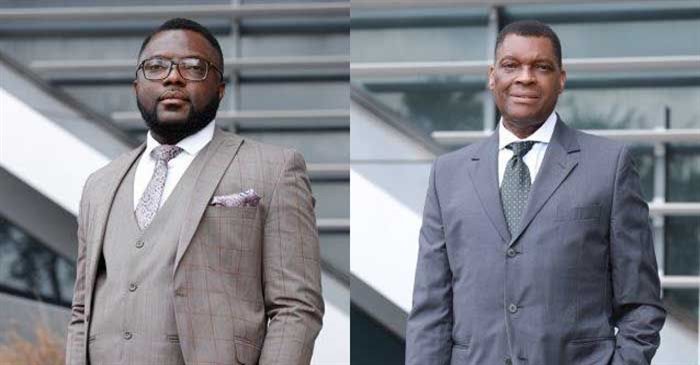The Osmotic Engineering Group (OEG) is a new player in the African advisory and consulting engineering market with offices currently in South Africa and Nigeria. With a group of highly experienced engineers at the helm, OEG is exploring novel ways to resolve the infrastructure deficit on the continent. The firm's key focus areas are water, energy and telecommunications and its directors are each specialists in one or more of these fields, having worked for corporate and utility institutions in Africa.

L-R: CEO Dr Frank Igboamalu, and business development director Ronnie Khoza, Osmotic Engineering Group
Dr Frank Igboamalu, CEO of the Osmotic Engineering Group, shared with us a bit more about the company's beginnings, its leadership team, and how OEG plans to tackle the infrastructure deficit in Africa.
Share with us your startup story. How did the Osmotic Engineering Group come together and who makes up its leadership team?
Dr Frank Igboamalu: Our startup story is best summarised in the following points:
- A vision of Africa in 2040 where every person has access to electricity, water and internet connectivity, to the same level as in Europe and other developed countries of the world.
- A dire need of basic infrastructure in Africa and a difficulty in sourcing project funding to realise project implementation.
- The leadership of Osmotic Engineering Group, as colleagues, former colleagues and friends, started sharing a common vision and passion for the development of Africa through an innovative business model that would lead to sustainable infrastructure and mobilising project funding, which was seen as a stumbling block to project development. This coming together was a solution that consolidated our startup story.
How can we make this happen? The secret is in the meaning of the word “osmosis”....
Osmosis is defined as “a process by which molecules of a solvent tend to pass through a semipermeable membrane from a less concentrated solution into a more concentrated one”. A less technical definition is “the process of gradual or unconscious assimilation of ideas, knowledge, etc.”. We can describe osmosis as “a gradual and unconscious assimilation of ideas, knowledge and skills” that flows from us to the communities that we serve. “Osmotic pressure”, simplistically, is the force that drives the process of osmosis.
That’s why our business motto at Osmotic Engineering is “To be the driving force for sustainable infrastructure”.
Africa has a shortage of skills, funds and sustainable infrastructure. We are fortunate to have earned the technical skills and experience to drive the development of people and infrastructure projects in Africa. The leadership team was drawn together based on its shared passion for this vision of Africa. We are engineers with backgrounds in mechanical, chemical, and electronics engineering. We have worked in the telecoms, energy and water sectors. We believe that the challenges of Africa require Africa-based professionals to lead in providing, designing, facilitating and packaging sustainable solutions. Our passion is laced with patience and planning to see our dream come true. We have energy. We are driven. We are innovative. We are new.
What is your business all about? Share with us some of the organisations short and long-term goals.
Igboamalu: Our services are technical advisory, engineering consulting and project development services with funding as a strong element in the fields of telecommunications, energy and water. Our goals are linked to our company strategy, especially on short-, medium- and long-term projects.
Some of our short-term goals include focusing on evolutionary growth, developing and building strong relationships and networks with our clients and service provider partners, project execution excellence, ensuring agile response to market dynamics and developments, and identifying a combination of projects with short-, medium- and long-term implementation timeframes.
Our medium-term goals include executing longer timeframe projects, building the business’s financial sustainability, planning for diversification, and expanding into more countries in Africa.
In the long-term, we believe that Africa has the potential to “leapfrog” developed countries in many areas, given the ingenuity required to solve its complex problems. We intend to take this experience we gain from Africa to other parts of the world.
How has the ongoing Covid-19 pandemic affected your business and sector? Do you see the light at the end of the tunnel yet?
Igboamalu: It is difficult to quantify the impact of Covid-19 in monetary terms or specific numbers at this stage. It has been difficult to meet face-to-face. Visits to clients’ premises or sites to do assessments were mostly postponed or delayed. Services and infrastructure budgets from government departments and municipalities were diverted to mitigation of the crisis. Our focus is beyond South Africa, and it has been a challenge to travel without compromising ourselves during restrictions and understanding the risk on our teams being exposed.
While Covid may have slowed us down in some aspects, it also gave us some advantages. Our young team were flexible in adopting to virtual platforms for internal meetings and engagements with external parties. Fortunately, being a young company at the time, our fixed cost base was low and we were able to adapt quickly to the new environment.
What is the Osmotic Engineering Group's approach to tackling the infrastructure deficit in Africa?
Igboamalu: We use our strong relationships with our consulting and advisory partners to create an enabling and attractive environment for investors, project funders, NGOs, donors, and governments in Africa. We apply well-proven and fit-for-purpose models to the development of large-scale infrastructure projects that gives confidence to investors, lenders, governments, off-takers and other key stakeholders.
How important is it for African-based solutions to be used in addressing Africa's challenges?
Igboamalu: The challenges in Africa are dynamic, complex, multi-faceted and geographically diverse. For example, in a country like Nigeria, with a population of over 200 million people, urgent refurbishment or replacement is required for ageing and ineffective infrastructure. Combine this with over 200 different languages and dialects that exist across the country and the problem is magnified.
We believe it is not only important but also critical that African-based approaches be employed to solve Africa’s challenges as there is first-hand understanding of the situation.
It is especially sensible to use Africa-based professionals who can provide solutions that the community would be comfortable with. Africa-based professionals who have been exposed to global training and experience would know what is available out there and identify fit-for-purpose solutions for communities. Where further interventions from outside are required, these should be identified and facilitated by local professionals and packaged accordingly.
How important is collaboration in the work that you do?
Igboamalu: Collaboration is the main pillar of our approach. Our business model is based on this. Total solutions for complex challenges will always yield better results with inputs from “combined forces”. Our team specialises in identifying strategic partners for specific projects to ensure they are delivered successfully, from strategy and conceptualisation to design and implementation, including the required project funding.
What differentiates the Osmotic Engineering Group from other advisory and consulting players in the engineering market?
Igboamalu: To us, technical advisory services include strategy development, project development, technical due diligence, integrated water and energy management plans, development of project agreements, and with our legal and financial partners, transaction advice, including on public private partnerships (PPPs) for government and project finance deals for the private sector.
In the advisory field, majority of industry players are typically accounting or audit firms where technical and engineering skills are not core business, or large engineering firms that have a primary focus on design and limited focus on advisory. We are a technical team that is primarily focused on advisory services. We have a strong technical knowledge base that we combine with a sound understanding of project development and strong partnerships with legal and financial advisory firms.
We offer technical advisory in the fields related to our areas of expertise, i.e., telecommunications, energy and water. This is our identified niche market. We are hungry for success, confident and passionate about the solutions we offer.
What does the future look like for the Osmotic Engineering Group?
Igboamalu: Exciting! We see great opportunities in many parts of Africa. We will be strategically selective in the projects we participate in and ensure a steady and sustainable growth of our business.
We want all of Africa to feel our service offerings.
Our business model aligns with the obviously big infrastructure gaps and lack of funding for infrastructure development in many countries in Africa.
We have a passion for developing young professionals in all the areas where our projects are, unleashing engineering and business talent. This is part of our vision.




































